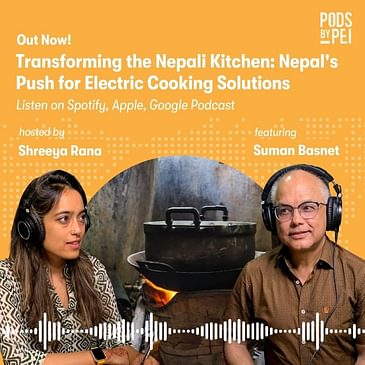#Ep.043
Nepal aims, ambitiously, to reach net zero emissions by 2045. Doing so requires it to extensively curb emissions from its energy sector, which accounts for 54% of its total emissions. One of its action plans to that end was a push to use green renewables through alternative cooking practices, where electric cooking has massive potential. It aims to ensure that electric stoves are used as the primary mode of cooking in 25% of households by 2030.
In today’s episode, PEI colleague Shreeya Rana sits in conversation with Suman Basnet, to discuss Nepal’s energy scenario, with a special focus on the potential of shifting to electric cooking. The two discuss the opportunities and challenges in transitioning to clean cooking practices, given its unique socio-economic and cultural practices. They also talk about the positive social, economic, and environmental impacts of shifting to cleaner forms of cooking, and its potential to mitigate climate change vulnerabilities.
Suman Basnet is the Team Leader at the Nepal Renewable Energy Programme (NREP), a Government of Nepal Programme supported by the British Embassy in Kathmandu. He is a renewable energy and management professional with over 35 years of experience in the development and private sectors. He holds an MBA in Technological Entrepreneurship from the Rensselaer Polytechnic Institute and an MSc in Energy Policy from the University of Sussex.
Click here to support us on Patreon!!
Click here to read PEI’s report on the Political Economy of Mainstreaming Renewable Energy in Nepal as part of the NREP.




